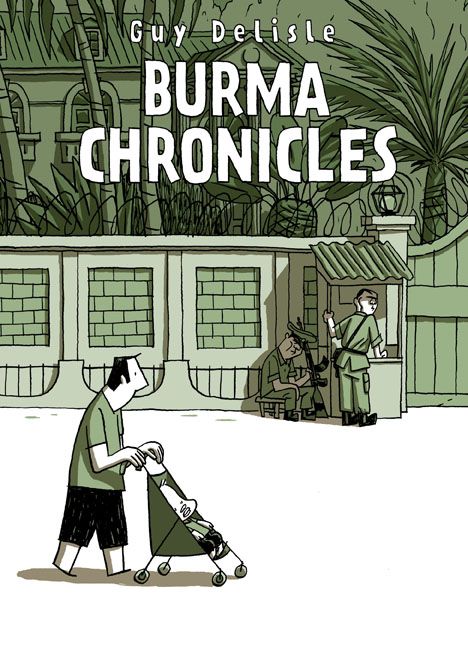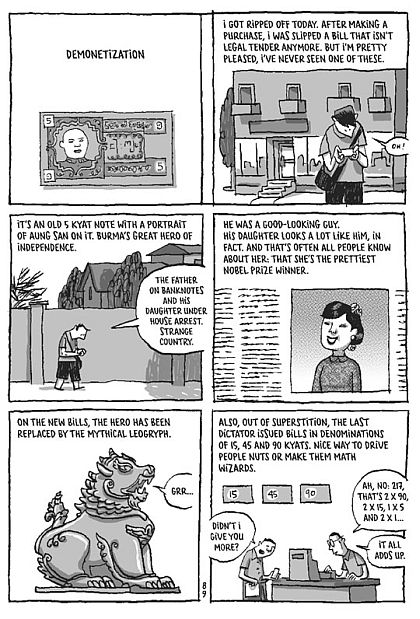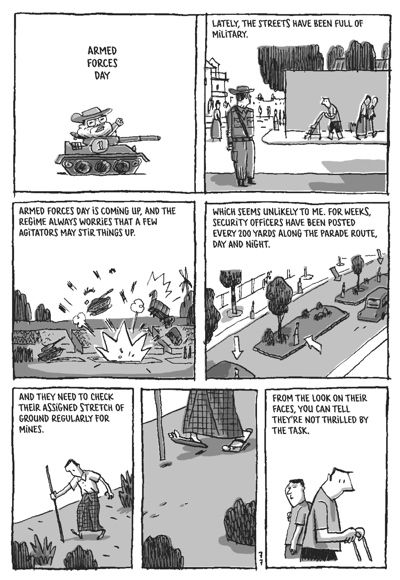After a couple of months I finally finished reading Guy Delisle's Burma Chronicles. Usually a fast reader, I could excuse myself because I was reading a few different things at once, but if I'm completely honest I have to admit that I was hoarding it, keeping this strangely mellow, deep book for the late nights to comfort and enrich. Now that it's over, I feel a bit lost.
This simple little diary/travelogue of a book charts the artist's living (and working) experiences in a foreign country. Like his previous work Pyongyang: A Journey in North Korea, it gives insight into many aspects of Delisle's daily life, as well as his observations about the politics and deprivation of Burma (officially called the Union of Myanmar). Unlike his trip to Pyongyang (where he went to work) this time he follows his wife, who is working with Doctors without Borders. Not only that, but this time he has a newborn baby to look after too. While the book is similarly delightful, a relaxed, deliberate diary of the author's personal life and direct experiences of the country he is in with the addition of his family make this a distinctly different experience.
Delisle occupies his time by drawing, writing, occasionally teaching a small animation class, buying supplies, taking care of his baby, going for walks and on a few memorable mini-trips he visits the remote and restricted clinics that his wife is working in. Once in a while he even socializes with other foreigners who're living and working in Burma.
The way he writes about his life with his family is very deliberate. They live together, they share things, but I don't have to read about it anything beyond the most basic communications between himself and his wife. It isn't that I'm not fascinated by other people's private lives, (I'm as intrusive as the next person, maybe more), but in this instance I find it refreshing to read an independent comic book which is deeply personal and yet totally involved with the world. He is an individual dealing with the world, with his kid and his work and this offers us many insights into his environment.
When he eats with people, he remarks on how the leaves are folded to create a waterproof roof. After goes on a strange little meditation retreat he draws little diagrams of the many cushions sits on to avoid aches and pains. When he goes grocery shopping he notices that there are more clerks than customers. While reading magazines, he is interrupted by the places where the censors have removed quotes, images, and sometimes even entire pages... The list of rich details and ephemera goes on and on, every aspect of Delisle's existence is layered. Every thing he does shows him (and through his book; us) that much more about himself and the world.
Biographical comic books can be very enjoyable, but it is surprisingly rare to read one that goes beyond the solipsistic overtones and instead ventures into a broad world view. Burma Chronicles is a book which manages to do this in a very intimate, personal, mellow sort of way. Delisle isn't an activist, he isn't oppressed in any way, but every day in Myanmar he is affected by the ruling dictatorship of the country he is in. When he goes for a walk he notices that a nearby neighbor is actually a well-known politician, under house arrest for many years. When he uses the internet, the connection is intermittent and what he can access is restricted. When he shows his casual animation class a published cartoon, they become afraid for their safety if they're seen associating with someone who is in any way critical of the government, even in a joking cartoon. Very little is mentioned about his day-to-day interaction with his wife, but when he meets with her friends at Doctors without Borders and the UN, they talk about how difficult it is for them to do their job. The resigned, difficult, painful life of the people of Myanmar is gradually and unrelentingly revealed throughout this sweet and lovely story, in a sort of peripheral way that makes it that much more poignant.
Totally unlike endearingly self-hating books like American Splendor or Poor Bastard, this book has more in common with something like Persepolis, (where the young female protagonist describes her experiences growing up in Iran.) However, while it has all of the intense observations of Persepolis, it has none of the intense drama, since Delisle is an adult, choosing merely to visit this culture. And while it is restrictive and strange to him, he is keenly aware that it is temporary. This offers us, as readers a far more leisurely and relaxed window into his reality, and it is part of the reason that as well as being revealing and enlightening, it is also relaxing and fun to read.
An insight into a real life. It doesn't thrill or excite, it enlightens and enriches. This may not be the stuff of teenage cravings, but it feeds the soul and nourishes the mind. To my mind it is the emotional cousin to the film My Dinner with Andre which may not be a comic book, but still, the feeling I left that movie with is similar to the residue of Burma Chronicles; oddly satisfying happiness. Not the same in terms of content, and it doesn't have the same kind of feverish, concentrated excitement about it. What it does share is the peculiarly deep affection and attention to human life in all its magical potential. A man moves through the world with his eyes open, and when he shares this with us, we're enriched by our contact with him. In that way, it satisfies similarly. It's unlike any other comic book that I've read, and I highly recommend it.
All too often the books I enjoy seem to end too abruptly or without the proper weight, leaving me without that all important feeling of completion. This book was a welcome exception. As it began, so it ended, building ever so gradually to a beautiful, elegant feeling of completion. It's a rich and interesting existence, much of it because he sees and notes the implications of his experiences, be they large or small. His work is characterized by his distinct awareness of this constant interaction between himself and others. The Dalai Lama talks about man's isolation, the desire to be independent, but he reminds us that in actuality we are always connected. There is no facet of our lives that is not touched by someone else, whether it is in the clothes we buy that are made by others, or the food we eat which was grown by others, our lives are all intertwined and we are all connected. I can't think of another comic book that illustrates this more elegantly or clearly than Guy Delisle's work.




